Intel Core i7 4960X (Ivy Bridge E) Review
by Anand Lal Shimpi on September 3, 2013 4:10 AM EST- Posted in
- CPUs
- Intel
- Ivy Bridge
- Ivy Bridge-E
Visual Studio Compile
Our compile test is back and better than ever. With a much larger and faster SSD (Samsung SSD 830, 512GB), we're able to get more consistent compile times between runs. We're now using Visual Studio 2012 to compile Mozilla's Firefox project. The compile is multithreaded however there are periods of serial operation where performance is bound by the speed of a single core. The end result is a benchmark that stresses both single and multithreaded performance. Compile times are reported in minutes elapsed.
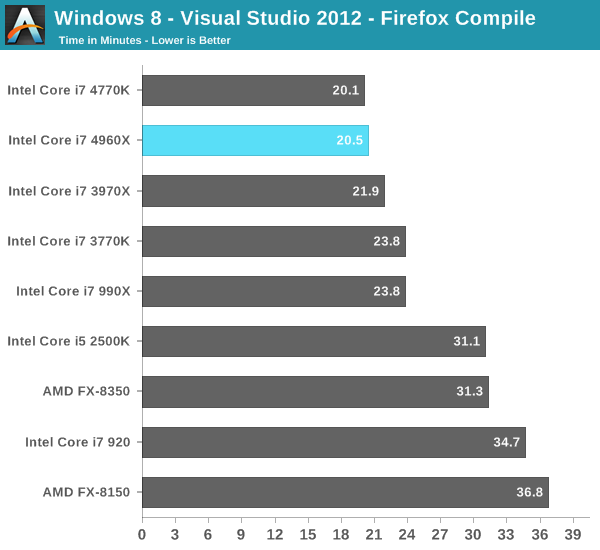
It's clear that IVB-E holds the advantage over Haswell when faced with heavily threaded workloads, but what about those workloads that are a good mix of both light and heavily threaded tasks? A medium-threaded workload if you will. It turns out our Firefox compile test is just that. Haswell's architectural improvements seem to do wonders for this test (under OS X as well), giving the 4770K a 16% lower compile time than Ivy Bridge. IVB-E on the other hand throws more cores at the problem, effectively equaling Haswell's performance but not exceeding it. In this case, if the rest of your applications are better threaded/demand more cores then IVB-E is the right solution for you. If, however, building Visual Studio projects is the most thread heavy thing you do then Haswell is a better option.
Photoshop
To measure performance under Photoshop CS4 we turn to the Retouch Artists’ Speed Test. The test does basic photo editing; there are a couple of color space conversions, many layer creations, color curve adjustment, image and canvas size adjustment, unsharp mask, and finally a gaussian blur performed on the entire image.
Time is reported in seconds and the lower numbers mean better performance. The test is multithreaded.
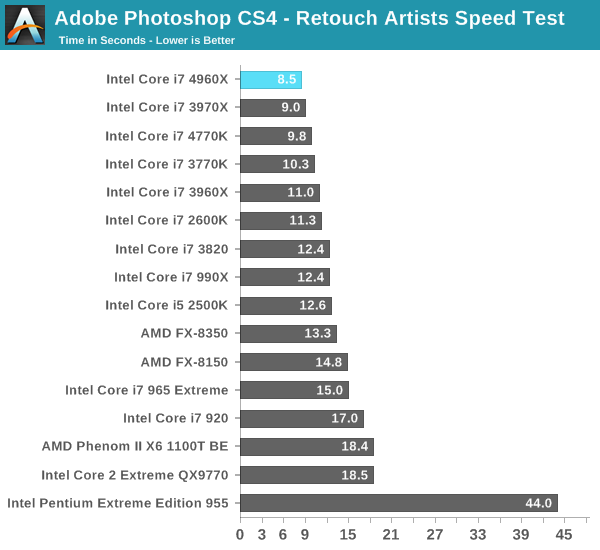
Our Photoshop test provides another example of an application with both lightly and heavily threaded behaviors. In this case, our Photoshop test favors the latter as the 4960X manages a 13% performance advantage over the 4770K. Once again the IVB-E advantage over SNB-E is around 5%.
File Compression/Decompression
The 7-zip benchmark is a CPU bound multithreaded integer workload that looks at 7-zip compression/decompression algorithms where the IO subsystem is removed from the equation:
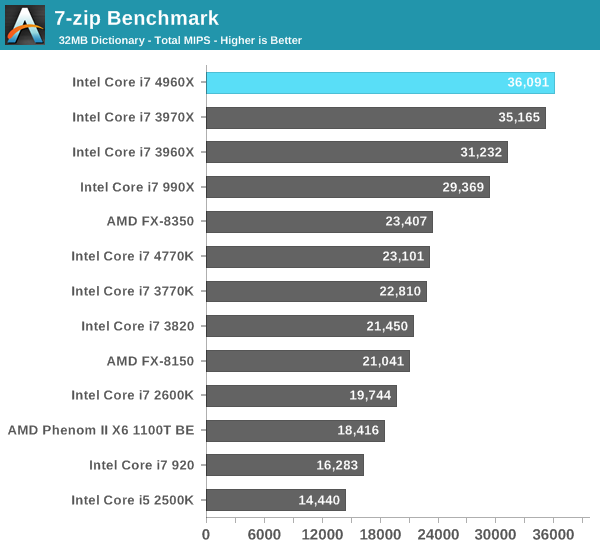
In its biggest advantage so far, the 4960X outperforms the 4770K by 56% in the 7-zip test. The IVB-E performance advantage compared to SNB-E shrinks to under 3% here. Heavily threaded integer workloads are also well suited for AMD's FX architecture. Here the FX-8350 is able to equal Haswell's performance.
Next up is our old Par2 test. Par2 is an application used for reconstructing downloaded archives. It can generate parity data from a given archive and later use it to recover the archive. Chuchusoft took the source code of par2cmdline 0.4 and parallelized it using Intel’s Threading Building Blocks 2.1. The result is a version of par2cmdline that can spawn multiple threads to repair par2 archives. For this test we took a 708MB archive, corrupted nearly 60MB of it, and used the multithreaded par2cmdline to recover it. The scores reported are the repair and recover time in seconds.
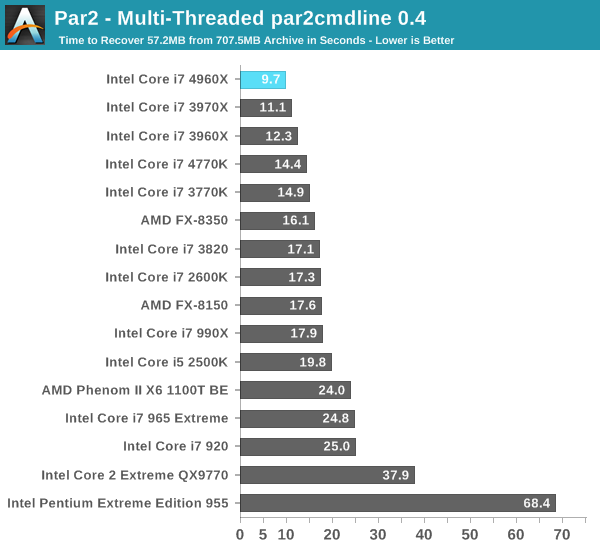
Here's another heavily threaded workload that does very well on the 4960X. We also see a rare situation where IVB-E increases performance over SNB-E by more than 10%.
Excel - Heavy Math
In our final CPU centric test we're running a monte carlo simulation on a large Excel spreadsheet. The process is well threaded.
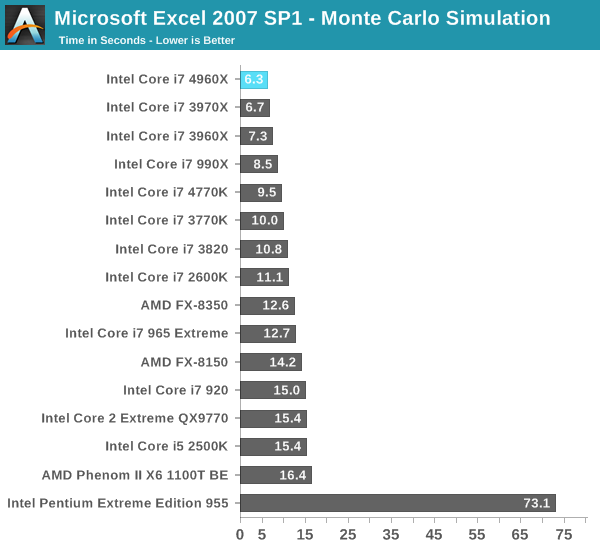
With 50% more cores, the 4960X delivers 33% better performance than the 4770K. If running multithreaded math workloads is up your alley, there's no alternative to the 6-core extreme edition parts.










120 Comments
View All Comments
Oscarcharliezulu - Friday, September 6, 2013 - link
This reminds me, of years ago when I had access to the first DEC Alpha with its super fast clock speed and fast IPC, a IBM AIX RS6000, a HP9000 PA-RISC and a multi-socket Sparc. The alpha was the fastest by a long way versus multi core even on our SAP systems. I still use this as a rule of thumb that for most tasks a faster clocked processor is better most of the time, except for very specific situations - and in general you will know what they are. I'm battling with what to do with my next upgrade, I really wanted a top end ivy-e but it really doesn't seem worth it compared to a 4770, even with my need to run big VM's. he'll its not enough faster than my i2500s ivy imac to be worth it.DPOverLord - Tuesday, September 10, 2013 - link
very interesting review coming from an i7-930 O/C to 4.3GHZ makes you debate if it makes sense to upgrade to the 4930K and a RIVE.For those considering there is also another benchmark review of the 3930K vs I7-930 on 2, 3, & 4 way TITAN SLI GK110 Scaling at 7680 x 1440 and 7680 x 1600. Worth a look.
DPOverLord - Tuesday, September 10, 2013 - link
very interesting review coming from an i7-930 O/C to 4.3GHZ makes you debate if it makes sense to upgrade to the 4930K and a RIVE.overclock.net/t/1415441/7680x1440-benchmarks-plus-2-3-4-way-sli-gk110-scaling/0_100
For those considering there is also another benchmark review of the 3930K vs I7-930 on 2, 3, & 4 way TITAN SLI GK110 Scaling at 7680 x 1440 and 7680 x 1600. Worth a look.
Remarius - Wednesday, September 11, 2013 - link
Really useful - I missed that thread somehow.Fierce Guppy - Saturday, September 14, 2013 - link
Should nVidia's shadowplay turn out to be rubbish then I could use that CPU for encoding recorded gameplay, otherwise there's no benefit in having a 4960X over a 4770K. It won't improve my gaming experience any. Two GTX 780s will do that.scorpyclone - Tuesday, September 24, 2013 - link
This is a great article for informing us about the latest and greatest architecture and chips, anyway I too have stuck with my powerhouse system since 2006, mine is the Q9550 and P35 mobo, DDR2 second generation SSD and so forth!It has been rock solid and frankly I don't think I remember the last time it crashed, come to think of it it has never crashed! (...and I am able to have all my progs running plus 30 plus instances of chrome, yeah I should do something about that!)
So there you have it, now i m looking at the LGA 2011 with X79 and maybe (If i can convince myself of the benefits of having a six core system) an i7 4920 or40, ...but will probably go with their 4 core 10 or 12 meg cache cpus...the difference in having 2 more cores is 200 bux! I don't have any problem spending 3 bills on a nice CPU, but when it comes to 2 more bills just to get 2 more cores, I really cant convince myself of that, since i can think of so many other ways to spend those two bills with more return so to speak!
So yeah building a powerhouse of a system that costs a little more but is rock solid and still faster than 90 percent of what is out there is worth it for me, and I am sure others will say the same!
Or maybe I can just get the better P45 chipset, and stick with this system for another two to three years!
Laphaswiff - Monday, December 9, 2013 - link
δοκοῦσι δέ μοι Λακεδαιμόνιοι μάλα δεινῶν ἔργον ἀνθρώπων ποιεῖν. νῦν γάρ φασιν ἐκεῖνοι δεῖν Ἠλείους μὲν τῆς Τριφυλίας τινὰ κομίσασθαι, Φλειασίους δὲ τὸ Τρικάρανον, ἄλλους δέ τινας τῶν Ἀρκάδων τὴν αὑτῶν, καὶ τὸν Ὠρωπὸν ἡμᾶς, οὐχ ἵν' ἑκάστους ἡμῶν ἴδωσιν ἔχοντας τὰ αὑτῶν, οὐδ' ὀλίγου δεῖ· (17) ὀψὲ γὰρ ἂν φιλάνθρωποι γεγονότες εἶεν· ἀλλ' ἵνα πᾶσι δοκῶσι συμπράττειν, ὅπως ἕκαστοι κομίσωνται ταῦθ', ἅ φασιν αὑτῶν εἶναι, ἐπειδὰν δ' ἴωσ' ἐπὶ Μεσσήνην αὐτοί, συστρατεύωνται πάντες αὐτοῖς οὗτοι καὶ βοηθῶσι προθύμως, ἢ δοκῶσ' ἀδικεῖν, περὶ ὧν ἔφασαν ἕκαστοι σφῶν αὐτῶν εἶναι συμψήφους λαβόντες ἐκείνους, μὴ τὴν ὁμοίαν αὐτοῖς χάριν ἀποδιδόντες.SeanFL - Wednesday, January 15, 2014 - link
I edit video from time to time and am currently using an i7-2600k system built in May of 2011. I've been looking at the 6 core i7-3930k, but not sure if it provides enough of an increase to build a new system. Are we closer to an 8 core solution coming out under $1000 in 2014? What's on the way?SeanFL - Wednesday, January 15, 2014 - link
typo, meant looking at the i7-4930k. Still wondering, is 8 core under $1k on the way this year?MordeaniisChaos - Thursday, April 17, 2014 - link
You guys should really, really include ArmA as a benchmark for CPU gaming performance, as it sees pretty much constant improvements as the CPU gets more potent. I do not understand why more sites don't use A3 for CPU benchmarking when they touch on gaming performance.